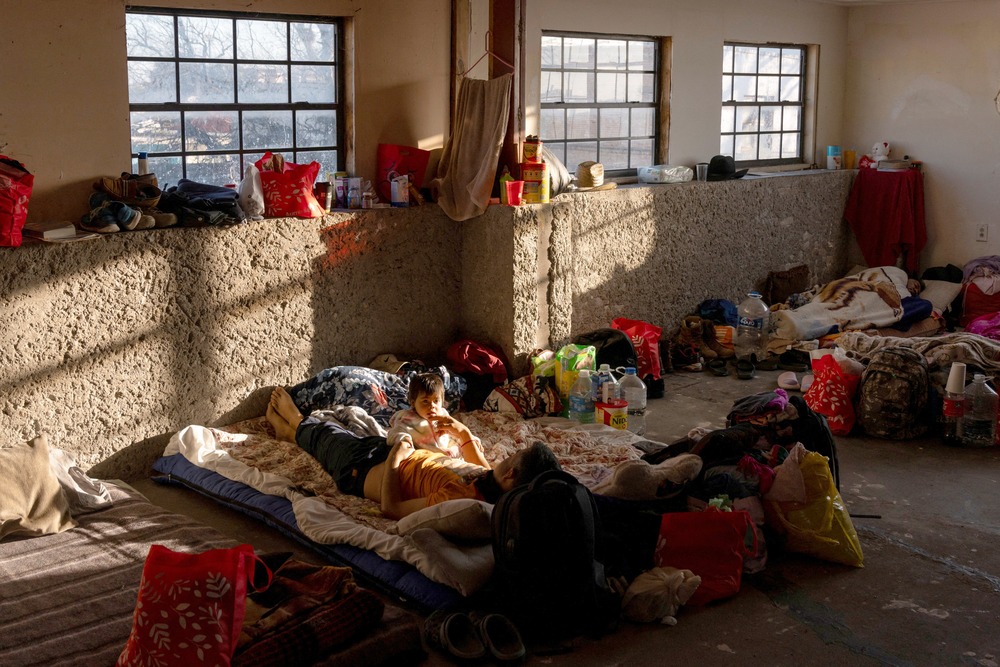
Fermin Brito, 50, caresses the chin of his 2-year-old daughter, Maria, as they lay in bed inside a migrant shelter Feb. 25, 2024, in Piedras Negras in Mexico's Coahuila state. Brito, his wife and daughter fled their home in the Mexican state of Guerrero after cartel members began extorting and threatening them with violence. (OSV News/Cheney Orr, Reuters)
Bishops in Mexico's southern Chiapas state have warned that conditions for holding elections are lacking after the May 12 massacre of 11 people — including two catechists — as drug cartels dispute territories and continue killing candidates ahead of the June 2 vote.
They also urged the country's three presidential candidates to "offer concrete proposals" for stopping the violence that convulsed swaths of Mexico and forced thousands to flee their homes in Chiapas — where criminal groups are battling for control over coveted routes for smuggling migrants and drugs from neighboring Guatemala.
"We consider that in some regions of the state affected by violence, displacement or controlled by drug trafficking, there are no conditions for elections to take place," Bishop Rodrigo Aguilar Martínez of San Cristóbal de las Casas said in a video statement for the ecclesial province of Chiapas.
"We urge candidates for public office to make concrete proposals to respond to the most urgent issues: violence, insecurity, drug trafficking, poverty, land exploitation, health and education," he continued.
Martínez, who was joined in the video by his auxiliary, Bishop Luis Manuel López Alfaro, expressed concern over "the wave of violence present in our dioceses, which destabilizes society and is often generated by organized crime," along with "the presence of corruption at all levels of government that generates much damage to the well-being of communities and families."
The bishops' warning followed a massacre in the municipality of Chicomuselo near the border with Guatemala, where 11 people were murdered in their homes on May 12.
Advertisement
Mexican media blamed the massacre on a criminal group aligned with the Jalisco New Generation cartel, which has been battling the Sinaloa cartel in Chiapas. Both cartels are forcibly recruiting locals to replenish their ranks, according to Catholics working in the area.
The Diocese of San Cristóbal de las Casas said in a May 17 statement that "organized crime members entered the community of Nueva Morelia around 5:30 p.m. and went directly to the homes of persons still in the community," murdering six men and five women in four different houses, including seven members of one family "gathering after the Sunday celebration."
The statement added the home was subsequently torched, "and the bodies of two of our sisters were completely burned."
One of the family members, identified as Ignacio, served as a catechist and also was a deacon candidate. His slain sister-in-law, identified as Teresita de Jesús, also was a catechist in Chicomuselo.
"These women and men resisted leaving their homes, in spite of the violence, threats and harassment from groups to join their ranks," the diocesan statement said.
The violence engulfing Chiapas comes as Mexico's electoral campaigns enter the homestretch — in races marred by violence, including the killings of at least 30 candidates, according to a count by news organization Animal Politico.
Five of those slain candidates were in Chiapas, where at least 213 candidates have resigned their place on the ballot, according to the state electoral institute.
President Andrés Manuel López Obrador has downplayed violence in Chiapas and Mexico at large, along with its impact on the election. "They would like to say that Chiapas is in flames," he said May 17, though he added, "There have been confrontations that have regrettably caused the loss of human life."





